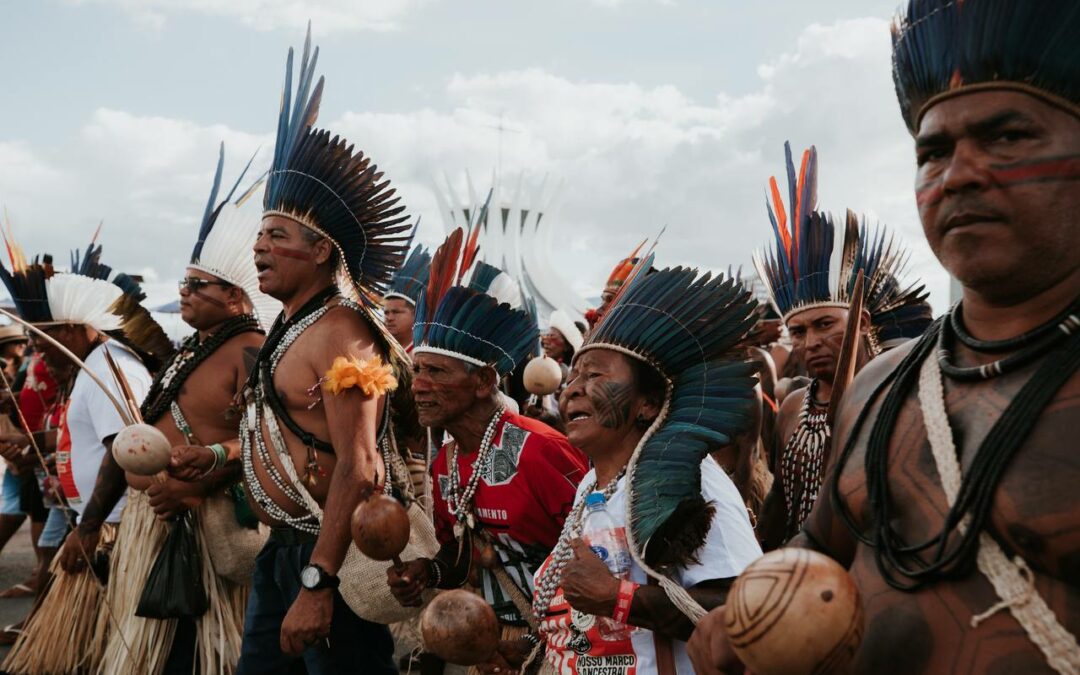Photo: @giuliannemartins
The Law 14.701, which transformed the Time Frame legal thesis into legislation, will again be debated in the country’s Supreme Court. The indigenous movement claims that indigenous rights cannot be negotiated
On this Monday, August 5, a conciliation chamber called by the Brazilian Federal Supreme Court (STF) will discuss the validity of Law 14.701, which legalized the Time Frame thesis. For the Articulation of the Indigenous Peoples of Brazil (Apib), the chamber intends to negotiate indigenous rights, which is why Apib has called for mobilizations against it across the country.
“The right to traditionally occupied territory is an original right secured by the 1988 Federal Constitution and cannot be negotiated. We need to guarantee that Indigenous Lands are demarcated and protected in order to combat climate change,” says Kleber Karipuna, executive coordinator of Apib.
The conciliation meeting at the STF will include members of the National Congress, the Federal Government, governors, mayors and six representatives from Apib. This distribution of seats disregarded the fact that Apib is made up of seven regional organizations that together represent more than 300 indigenous peoples in Brazil.
The creation of the conciliation chamber was ordered by Justice Gilmar Mendes. Maurício Terena, an indigenous lawyer, explains that the creation of the chamber should have been discussed in the plenary of the Supreme Court, which has not happened so far.
Dinamam Tuxá, Apib’s executive coordinator, recalls that the STF has already declared the Time Frame thesis unconstitutional. “This decision by Justice Gilmar Mendes goes against the Constitution and the Supreme Court itself. We want them to listen to us and not to put our lives on the table for negotiation,” says Dinamam.
Claims before the Supreme Court
At the Court, Apib filed a Direct Action of Unconstitutionality (ADI) and requested that the Indigenous Genocide Law, as Law 14.701 was named by the indigenous movement, be suspended until the ADI is appraised by the Court. Another Apib’s legal action requests that all the cases regarding the Time Frame have Justice Edson Fachin as rapporteur.
While the debate on the Time Frame remains uncertain, indigenous peoples are facing escalating violence. According to the report “Violence against indigenous peoples in Brazil” by the Missionary Indigenous Council (Cimi), 208 indigenous people were murdered in 2023, the second worst result since 2014. The figure represents an increase of 15.5% compared to 2022 (during Bolsonaro’s administration) and contrasts with the 3.4% reduction in total homicides registered in the country last year.
Brazil’s biomes are also suffering from the violence caused by the Time Frame, since indigenous peoples are the main guardians of the environment. In 2023, the average deforestation area in Brazil was 5,013 hectares per day, with more than half of it being registered in the Cerrado, followed by the Amazon with 1,245 hectares of deforestation per day. The data comes from Map Biomas’ Annual Report on Deforestation in Brazil.
Background
The Time Frame argues that indigenous peoples only have the right to the demarcation of their lands if they occupied them on October 5, 1988. This thesis disregards the history of violence faced by indigenous peoples, which made it impossible for many peoples to be in their territories on this exact date.
Despite being declared unconstitutional by the Supreme Court, last year the thesis was transformed into legislation by Law 14.701. In addition to the Time Frame, seven other crimes against indigenous peoples have been legalized by this law and will be discussed in the conciliation chamber:
-
Demarcation of indigenous lands with the participation of states and municipalities;
-
Cooperation between indigenous and non-indigenous people to explore economic activities;
-
Demarcations can be contested at any time;
-
Exclusive usufruct rights cannot override national defense and sovereignty policies;
-
Invasion of indigenous land can be considered in good faith with the right to compensation;
-
Prohibition of requests to review the area of already demarcated indigenous lands;
-
Legal uncertainty in ongoing demarcation processes.

